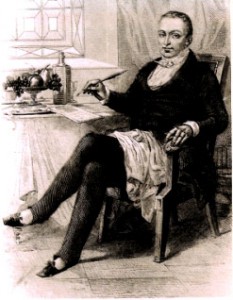 Here’s an analogy I thought of today: classes are like dining rooms; workshops are like kitchens. During classes, particularly seminars — as in restaurant dining rooms — you get a chance to develop your taste, figure out what you like and what you don’t, and expose yourself to different ways of cooking / writing. In a workshop setting — as in a kitchen — you get a chance to try out and develop the skills that will enable you to cook / write what you like. That’s why it is so important for graduate students — and undergrads with intellectual aspirations — to move as fast as possible into a workshop setting, first as attendants (and sharp questioners), then as discussants, and finally as presenters. Classes don’t get you there; you don’t get exposed to the process of producing scholarship, only its product.
Here’s an analogy I thought of today: classes are like dining rooms; workshops are like kitchens. During classes, particularly seminars — as in restaurant dining rooms — you get a chance to develop your taste, figure out what you like and what you don’t, and expose yourself to different ways of cooking / writing. In a workshop setting — as in a kitchen — you get a chance to try out and develop the skills that will enable you to cook / write what you like. That’s why it is so important for graduate students — and undergrads with intellectual aspirations — to move as fast as possible into a workshop setting, first as attendants (and sharp questioners), then as discussants, and finally as presenters. Classes don’t get you there; you don’t get exposed to the process of producing scholarship, only its product.
One of the best features of my Chicago education was the ability to participate in two, three, four weekly workshops where I could read, comment, discuss, and ultimately present work-in-progress. This is of great value, and it will improve your own work even if you never present. Over time, you will internalize the critical skills you see others apply to yet someone else’s papers and will learn how to apply them to your own work, becoming your own discussant and critic. This doesn’t mean you will be able to do without outside critics, but it means you will be able to take your own work to another level even before you bring the other critics in.
So, if during grad school you find yourself thinking workshops are time consuming, think again. They are as important as classes or any other activity. Go to at least once a week, read the paper in advance, come prepared with (at least) one hard question and a suggestion on how to fix the problem you spotted. (The former is useful, but without the latter you run the risk of being ignored or, worse, disliked.)
I know of no better way of developing your critical thinking skills at the same time as you develop your intellectual taste. Particularly if you’re fortunate enough to be at a place where a workshop will always include criticism from those who agree with the author’s viewpoint but disagree with the argument and from those who see things from a completely different viewpoint. Internalizing these two voices is one of the joys of intellectual life.

0 Responses
Stay in touch with the conversation, subscribe to the RSS feed for comments on this post.